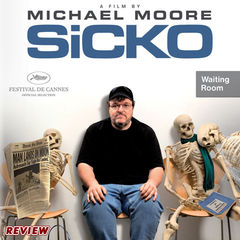
When Michael Moore’s Sicko was in theaters earlier in the year, it had a hard time connecting with audiences and $24 million take at the box office was considered a “failure” in comparison $120 million take of Fahrenheit 9/11 only three years prior.
Maybe people weren’t interested in the controversy Sicko generated. Maybe they had grown tired of the conservative vs. liberal debate that nearly every pressing issue has devolved into. More likely than not, they probably felt so overwhelmed and powerless in the face of the medical systems, they didn’t have much hope that a documentary could unravel its riddle.
There is no question that Moore had his work cut out for him when making Sicko. But he approached the concept of the broken American health care system in a very democratic way. Soliciting for personal stories from visitors to his web site, Moore gathered over 25,000 e-mails detailing the frustration and hopelessness this small sample of American citizens faced when trying to acquire reasonable health care.
Now Moore was faced with the problem of telling 25,000 stories.
Some stories serve for a laugh. One man who sought to provide his daughter with an ear implant was denied coverage, but found his insurance provider willing to change their stance on the issue by merely bringing Moore’s name into the conversation. “Has your CEO ever been in a film before?” he asked. His daughter got the implants.
Another woman told the story of being charged by her insurance company for being taken to the hospital in an ambulance after a car accident because the ambulance ride was not pre-approved. “I don’t know when exactly I was supposed to have it pre-approved,” she says. “Was it after I regained conciousness in the car and before I was placed in the ambulance?”
Some stories serve to shock. Moore talks to individuals who worked within the health care industry who were hired to turn sick people away. An investigator that would go through ever record imaginable to find out if you failed to disclose a pre-existing condition. A call center worker giving quotes to sick people over the phone, but knows they’ll be denied due to medical history – bound from saying anything to prospective customers. A medical reviewer who reveals she was instructed to maintain a 10% denial rate and that doctors with the highest rate of denials would actually receive a bonus.
Time and time again, Moore serves to us examples of a health care industry run amok and the political powers that be that have allowed it. Neither Democrats or Republicans get off lightly in his expose. Hillary Clinton, for example, once the greatest proponent for universal health care in the early 90’s is now the second largest recipient of campaign donations from the health care industry.
But Moore isn’t simply finger pointing in this movie. There is plenty of blame to go around. From the insurers to the pharmaceutical companies, to the lawyers, lobbyists and the politicians. Everyone is taking their cut.

Moore wanders into dangerous territory when he starts to travel abroad. Comparing the American health care system to those of Canada, England and France, he’s been chastising for making them look like some kind of utopia.
If I could editorialize for a minute, this is where Moore’s critics get it all wrong. Assuredly, he is only showing a piece of the whole picture. But he’s doing it to incite a specific emotional response not unlike any other filmmaker or any other documentarian for that matter. It’s not journalism. It’s whistle blowing – and it’s two different things.
Granted, things start to step out of line when Moore takes three Ground Zero rescue workers to Guantanamo Bay, Cuba for medical attention. Captured enemy combatants – terrorists, he claims – get better health care than the men and women who risk their lives after 9/11.
But once he arrived in Cuba to seek medical treatment from the country’s free health care system, the footage speaks for itself.
The rescue workers were asked for the names and nothing more. A full battery of tests were performed on each of them. Thorough diagnoses and health plans to follow when the returned home were given to them. For one woman with respiratory problems, she was given inhalers for free that would have cost over $120 in the United States.
The point, Moore states, is that even in the supposedly “worst” countries like communist Cuba – if they can take care of the sick, an “enemy” no less, without thought or question to who will pay for it, then why isn’t that something American policy makers can adopt?
I think regardless of where your personal politics lie or even what you think of Moore as a filmmaker (or muckraker, whatever you prefer) most people can agree that the American health care system is not the best it can be. For your own education, Sicko is an easy an access point to understanding a complex issue that you’re likely to come across. Even if you don’t agree with it, maybe it’ll prompt you to do your own research. A few more voices asking questions never hurt.
“If we see a good idea,” says Moore. “We take it. If they build a better car, we drive it. If they make a better wine we drink it. So if they’ve found a better way to take care of their sick, to teach their kids, to take care of their babies… then what’s our problem? Why can’t we do that?”
The logic is hard to refute.
I hope everyone had a chance to listen to The Triple Feature talkcast last night. If not, it was a good show. We covered a lot ground talking about American Gangster, Bee Movie and Shia LaBeouf being arrested in Chicago. Good times.
Something else I touched on quickly was the release of Michael Moore’s Sicko out on DVD today. In addendum to the review posted above, I have one copy to give away, so I’m running a little contest.
Download last night’s episode of The Triple Feature from our profile page and listen for the first half of a clue. Combine it with the second half of the clue (that I’m going to give to you in a second) and e-mail the compelted clue to theaterhopper@hotmail.com with your name and address. Make sure the subject line of your e-mail is “SICKO” so I’ll know you’re entering the drawing. One winner will be chosen at random. If you don’t want to download the show from TalkShoe, we’re also available on iTunes. Sign up for our podcast and have the latest epsiode sent to your computer every week!
Anyway, without further delay, the second half of the code is “YOU.”
Send in the complete phrase for your chance to win!
GOOD LUCK!
Related Posts ¬
| May 11, 2009 | LOOKING FOR A GOOD PLACE TO START |
| Feb 17, 2009 | OSCAR BALLOT |






